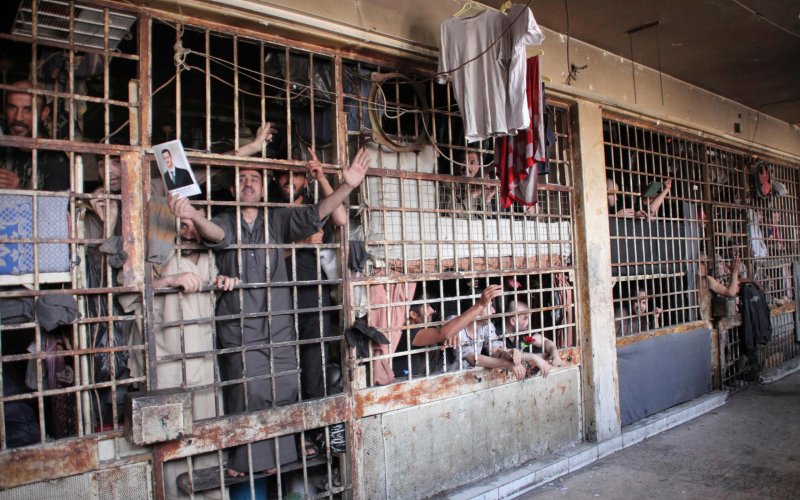Detainees in Aleppo Central Prison, Aleppo, Syria, May 2014
Amid Syria’s economic crisis and conflict, members of the Assad regime are continuing to profit from large bribes from the families of detainees.
The families are routinely paying regime officials to free relatives or just to visit them in prison. In a sample by a Syrian NGO, the total is almost $2.75 million.
The Association of Detainees and the Missing in Sednaya Prison extrapolates from its finding:
If we assume that the total number of forcibly disappeared people is 100,000 (…an estimate based on the cases that have been documented by the Syrian Network for Human Rights) and that a total of 250,000 people have been arrested and released (which is a very conservative estimate, since the real number is probably much larger), then the total amount paid is close to US$900 million.
Even before the Syrian uprising began in March 2011, between 100,000 and 250,000 people were arrested or forcibly disappeared. Since the uprising, tens of thousands of detainees have been executed, tortured to death, or perished from poor conditions.
The report is based on a survey of more than 1,200 former detainees and family members.
Almost 1/4 said they had been extorted. Some paid only a few thousand dollars or less; others, especially families in exile, gave up to $30,000.
“Arrest and monetary extortion of the population constitute a great source of funding of the state, and its repressive apparatus specifically,” the ADMSP summarizes,
Diab Serrih, the report’s author, says of the money going to corrupt officials and the “deep government ruling Syria behind the scenes”.
It’s an industry of detention. The Syrian regime is built on security and intelligence branches. They pay poor salaries to encourage corruption and the bribes finance this infrastructure of detainment.
See also Syria Daily, July 3, 2017: Report — 13,000+ Killed by Torture in Sednaya Prison Since 2011
One former prisoner testifies that he was detained in nine different prisons in three years, as his family paid $30,000 in bribes seeking his release.
Like many families, mine kept paying $1,000 here and $1,000 there, hoping they were giving it to a person who could get them information. Eventually they paid a large sum to a lawyer who told them that some of it will go to a judge and some to the security forces.
Families speak of handing over thousands of dollars, only for officials to demand more money and then disappear when they were paid in the “scam”.
The few families — about 4% — who could visit relatives recalled the brief moments with husbands, sons, or fathers. Manal al-Rifai recounts:
The visit, which lasted only four minutes, felt like an era…an era of torment and oppression. When he turned around to leave, I noticed that his pants were sliding off his body and that he was unable to lift them. I felt
like his legs were two melted ropes. I was imagining how much they would beat him now, because I heard
that they used to beat the detainees after visits.
The report calls on the international community to pressure the regime and its backers, especially Russia, into revealing the fate of the forcibly disappeared, allowing families to visit detainees who have survived, and disclosing where victims are buried so remains can be returned to their families.
Only 3% of families in the ADMSP sample said they obtained a death certificate and only 1% a personal or family record from civil affairs proving the death of the disappeared detainee.
See also The Agony for the Wives of Syria’s Disappeared Detainees

